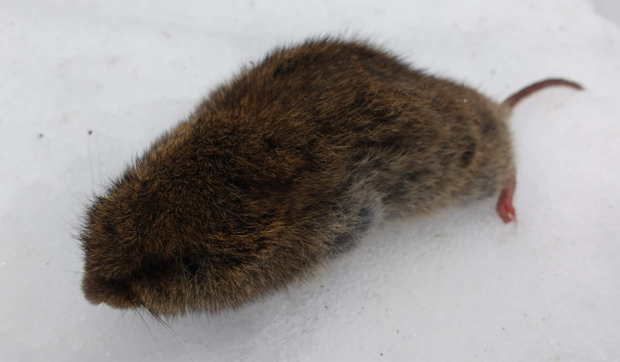Voles can be differentiated from mice by their rounded, chunky bodies and short tails. Roughly the shape of a small baked potato, they are a snack-size food source for many species of local wildlife.
Good Natured: Nature Snack Time
February 18, 2022
So how did you spend your Super Sunday?
Maybe you cheered for the Bengals. Maybe you cheered for the Rams. Or maybe you just tuned in for the commercials or the halftime show.
Me? I showed up for the snacks.
Unlike Thanksgiving or Christmas or other major holidays where a big sit-down meal is a focus, Super Bowl Sunday is the sort of event where grazing reigns supreme. Chips and dips, cheese and crackers and, in a nod towards healthful habits, a veggie tray line up alongside meatballs, chicken wings and sliders in a food fest that takes place over several hours, one small plate at a time.
Plopped in front of the TV, we take in probably twice as many calories as we would have at a sit-down meal, and have a marvelous time doing it. There’s no doubt, sometimes it’s fun to have appetizers and snacks instead of a full meal.
However, for some of our local wildlife-especially coyotes and foxes, hawks and owls-snacking isn’t just an occasional treat, it’s a way of life. And in winter it can be the difference between life and death.
In springtime, these species can count on an abundance of young wildlife, as well as the return of chipmunks and ground squirrels, to add to their diet. In summer and fall the mammals also consume a fair amount of fruit and even a few vegetables. But in winter, unless a deer gets hit by a car, it’s Snack City all the way.
Instead of taco dip or a shrimp tray, though, these animals turn to nature’s equivalent of snacks and appetizers: namely white-footed mice and meadow voles. These rodents might be a bane for homeowners, but for wildlife with a taste for meat, these guys are their bread and butter.
In winters when snow cover is deep, filling up on furry snacks takes a little more effort. Mice and voles have the luxury of scurrying around in the relative safety the subnivean layer, that open space that lies between the ground and the snow. Hungry mammals sniff and listen; hungry birds primarily use their supreme hearing.
Can you picture a coyote or fox pouncing in deep snow? Have you found raptor wing imprints after heavy snowfall? In either case, it was snackable rodents those hunters were after.
This year though, it’s a different story. With minimal snow cover over much of northern Illinois the snacks, I mean mice and voles, have had to be much more wary.
Even the several inches we received on Groundhog Day (St. Charles’ total was 5 in.) didn’t make much of a difference. Although the snowfall started out heavy, it turned fluffy as the temperatures dropped. Over the snowy, blowy evening it formed drifts where some coverage was over a foot but in other areas only a few inches.
Out on a walkabout the next day, I saw a vole chugging along beneath a thin coating of powdery white stuff. You know that Warner Brothers gag, the one where Bugs Bunny tunnels just below ground, then pops up somewhere he hadn’t intended? I kid you not, that’s what the little rodent looked like. (If only he’d pulled out a map, and uttered the famous “I knew I shoulda taken that left toin at Albuquerque!”)
To remain undetected, subtlety, and even stealth, are of the essence. But, let’s face it, most rodents are anything but.
Some animals use speed as a survival tactic, but this is a no-go for rodents. Their scampering may make them look fast, but it’s not a sustainable pace. A few quick dashes and they need to rest. When their resting place is the middle of a field or yard, it usually means hasta la vista, little herbivore.
Then there’s the way rodents feed. The main part of their diet is seeds and plant material, which they consume while digging and scratching about. This foraging technique is effective, but hardly invisible-nor inaudible.
Once they’ve found something edible, they have to chew it. If even our second-rate human ears can detect a mouse or vole gnawing on nut shells or seed husks, just imagine how loud that nibbling must sound to a coyote, fox, hawk or owl-creatures whose hearing is up to 10 times as sensitive as our own.
There’s no doubt, Bistro Rodentia is open for business.
I’m hoping to make time soon, while we still have a wee bit of snow on the ground, to head out and look for more signs of snacking. I’ll keep my eyes open for tracks, and scat, and the ultimate prize of owl pellets.
But first, I think I’ll have a snack.
Pam Otto is the outreach ambassador for the St. Charles Park District. She can be reached at 630-513-4346 or potto@stcparks.org.

